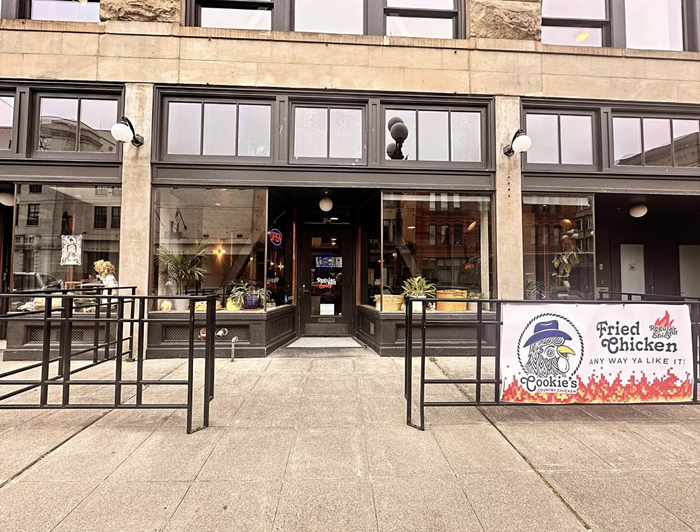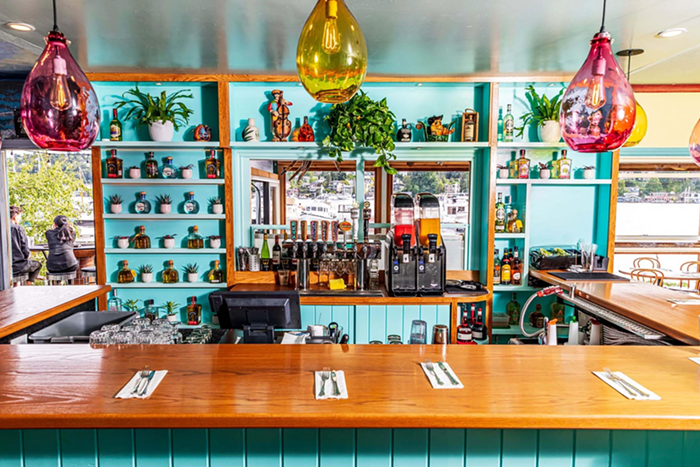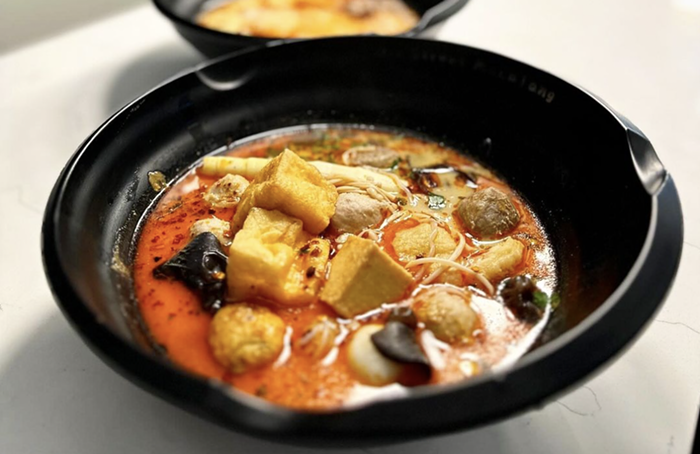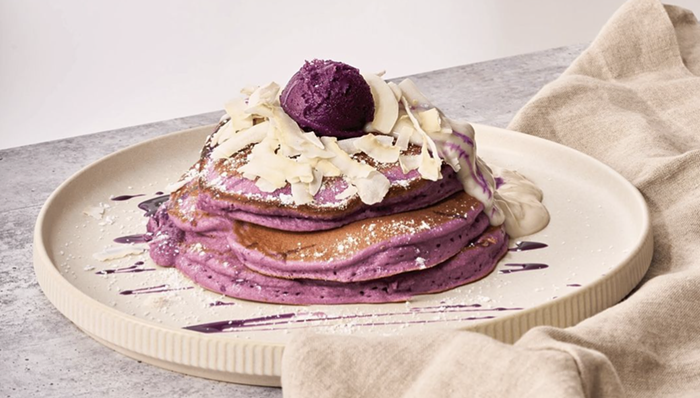If 2020 is the year of the food and beverage pivot, few have been more dazzling, or more preternaturally non-discursive, than that of Eric Rivera’s Addo. From inside a converted coffee bar on Ballard’s NW 24th, Rivera and his small seven-person team have pirouetted effortlessly from an in-demand tasting table experience to an all-encompassing digital expression of a restaurant. From in-house delivery to pantry staples, gamified takeout experiences (Oregon Trail dinners), and outrageous subscriptions (a dessert experience known as “OnlyFlans”), Addo in 2020 is a real-time exploration of what it looks like for a restaurant to survive.
Except, well, let’s give that just a beat. My lede is at least partially bullshit.
Rivera’s work this year has not been “effortless”—far from it. Rivera is white-knuckling this thing, adapting week over week to keep his restaurant afloat, fusing every ounce of his personality and worldview into a modern digital restaurant in plague times. Rivera does all the web design and graphic design, making for an ever-changing experience of updates and drops that feels more like following a cool indie fashion brand than it does a restaurant. He also openly courts controversy, calling bullshit where he sees it on chefs sacrificing safety for profit during COVID and comparing those dining out cheerfully in packed dining rooms to dinosaurs amidst meteor impact. “I’m pretty open about my opinions on things,” Rivera told me during our conversation on the back bar of his restaurant. “If I see something stupid in the industry, I’m going to call it out.”
From whole dinners to home-cooking building blocks to team building and cooking class experiences, it feels like there’s nothing Rivera won’t try. “We sell plants now,” he tells me, laughing, as he gestures to a wall of succulents. “That’s adaptability.” But along the way, one is given a glimpse at a new kind of chef identity: extremely online and painlessly digital. Thirty years ago, if a chef were good on camera—a Bourdain, an Emeril, a Rachel Ray—a whole new world of opportunity opened up to them. So too goes the digital chef in 2020, and Rivera, more so than perhaps any other chef right now in America, is a living embodiment of this potential. It is dizzying and delicious to watch.
This interview has been gently edited and condensed.
Hey Eric—Thanks for speaking with me. I want to start by saying, you know, in terms of pivoting to an online restaurant experience, you seem to have a really natural touch. Where does this ability come from?
I’ve always done online work. When I started in restaurants, it was a function of me trying to get a restaurant job and nobody wanted to hire me. Then I started a food blog while I went to culinary school, and that entire time I kept on doing it—documenting, revising, talking to people. I’m a terrible writer, and I’m not much of a food personality—I wasn’t trying to be a personality. Honestly, I was just trying to figure out how to talk to people and develop a message, to build something beyond me being a chef and knowing what I am and what I can do. That can only go so far.
It felt like it was important to build a brand that’s not fake. I’m not trying to be something for everyone or Mr. Smiles or always positive—I’m trying to adapt. I talk to my guests and get to know who they are.
I want to be clear, if it seems like I’m good at running a restaurant in 2020, well—regardless, all of this shit sucks. It’s not fun. People are dying. It’s still a pandemic. I’m not trying to gloss over that and say, ‘Here’s your release, here’s your time away…’—we are working with the reality of what’s happening around us while trying to give you good food, and we can entertain, too. It might not be for everybody, and I’m okay with that.
I’m curious about the strategy games and team building dinners you’re offering. Was this another COVID idea, or does it come from some other experience?
We were doing those here already, before COVID, but it was under the radar because a lot of people didn’t need to do that when they went out for dinner. Making a game or an experience out of food, there’s an aspect of it that can quickly become like…Teatro Zinzani or something, really over the top stuff. Mine is more like going to a local play. You have to kind of use your imagination a little bit to get into it. It’s not high production value, and there’s a lot of experimentation going on.
When COVID came, we had to flip the script and go all virtual, and the games—there’s a lot about that work that actually makes sense in an online setting. So we do games that are based on the Oregon Trail, but we also do cooking classes. Those are both really easy to do online, and we took that template and started applying it to other ideas, like the team building experiences.
What you’re talking about is a kind of pop culture fluency—an “onlining” of the restaurant experience, which is bigger and more important than I think people necessarily realize here at this moment. It goes to a ‘future of food’ sort of place. Do you agree?
Sure, but at the same time, we have always done dumb random shit like that. I never wanted Addo to be a static restaurant. I don’t think that’s important anymore. Menus across the city offer the same things with the same products, and that’s not me. I didn’t want to fall into that trap.
I’ve been really on this weird other side of the industry for a while, being recognized for it, and wanting to be recognized for it, but then also not recognized at all, and honestly, I don’t give a shit. I’m going to do whatever I want. People are going to buy it, and people are going to say it sounds stupid. My goal is to find enough people who want to find it.
My background before food was sales, specifically mortgage insurance and financial services. That’s a very different world, but the sales stuff stuck with me, and when you start applying that mindset to restaurants and how menus work and building menus, it makes you realize that actually cooking is the easiest fucking thing to do, the easiest part of it all. The hard part is finding continuous ways to sell, especially within the dynamics of all this stuff that’s happened in the last year. It’s a lot, and it’s hard.
There were ten different times we almost had to close. Ten times. You see your sales drop quickly for reasons you can’t control, and it’s a hard time to pay bills, and then a spike comes out of nowhere, and I guess we’re still alive. But that’s the reality of it. I used to plan my menus out a year ahead of time and sell dinners ten months ahead in small ticket batches. Everything is week by week now.
There’s been a lot of talk in the restaurant industry about how to “eventize takeout”—how to convey fine dining, or a special experience, into the act of eating food from a restaurant at home. How are you approaching this?
We’re doing it by design. Ingrid and myself, we’re very good at that game—having people in front of us, talking to them, creating an experience, but now you have to package that idea up and send it out. The question becomes, what’s the control method?
We started by creating our own delivery system. We have our own delivery driver, who is our own employee. We do not use any of the third-party systems. It’s literally one guy, and we schedule him in advance. We can deliver around Seattle, out to the east side, West Seattle, Shoreline—we just pre-schedule it all. We do not do things like an “order and it’s there in 15 minutes thing”—that’s not what we do with people. Anything over $75 we include scheduled delivery with the order.
It’s cool because we control the process, which means it’s not somebody that’s coming randomly into our restaurant to pick up, and our customers see the same driver come through every time. This is a relationship. It allows us a comfort level with what we’re doing. And essentially it’s become like Jamie, our delivery driver, he is our front of house now. It happens outside the building, and for the guests, we have, like, a no-contact system and use a GPS tracking app, and it’s all really slick—but still, he is the best vision we have right now for the front of house experience. And it’s his job to make sure it’s there.
This is a pretty dramatic adaptation of what “front of house” means to a restaurant.
We have to adapt to concepts like this. There’s no choice. A lot of people answer to investors and are in a position where it’s actually cheaper to just shut down and wait out the virus. I don’t have to play by those rules. I don’t have investors. Nobody is telling me we have to close. It’s on me to come up with new ideas and push things forward. There’s no backing at Addo—we’re either here, or we’re out. That’s why adaptivity becomes so important.
You appear to be very good at it.
That’s the weirdest part. I think, you know, what I’m actually better at is cooking, and then being part of a face to face interaction with diners at a chef’s table. That’s my wheelhouse. But this year has stripped all that away from us. And it’s like—okay, cool, how do I fix this? What’s the length of time? There isn’t this social media PR team of people behind Addo—it’s literally just me and our very small team saying ‘fuck, we gotta figure this out.’
Honestly, the biggest change is that I’m treating my restaurant like retail now. It’s a lifestyle brand, like an indie fashion brand or something. It’s our job to be a tastemaker. I mean—we sell fucking plants now! You can shop with us to cook specific meals, but also for building block ingredients to develop your pantry. And so the question becomes, like, how do I package this up for you? I don’t have six to seven months to worry about perfect packaging. But I can drop my price points down and give the customer a little value.
New hot sauces. All with fruit from @kcline pic.twitter.com/0U5g2q8zCj
— Eric Rivera (@ericriveracooks) October 31, 2020
How do you land on what to offer week over week? Are you trying stuff out in real-time, or leaning on favorites, or what’s the calculus behind that?
There’s a lot of thought that goes into it. I think there are a lot of people who are afraid to buy shit from us because it’s different and weird. It’s not a caesar salad every time. It’s very unique, and that presents a challenge.
When we first went into the pandemic we had a lot of guests who didn’t know how to cook or warm shit up at home. And we kind of had to explain, you know, there’s a reason why this doesn’t feel like a fine dining experience at home. It’s never going to feel like that. It took around two months before people got into the cycle of understanding what was really happening to our world. We are a lot more evolved now.
What comes next for Addo headed into the winter months?
I started focusing on our strategy for this back in September. For me, the number one thing is addressing the holidays—we are live now with our holiday packages. I’ve always done turkeys, and it’s something I want to expand out and make even cooler. We are here to hit you up for holiday cooking.
My biggest focus is here is what experiences are like within a household. Around four months into the pandemic, people started getting sick of cooking at home. Doing the day to day bullshit, working or not, stressed out and depressed, dealing with kids, holy shit—I can’t imagine too many people wanting to sit there seven days a week after everything else at 5 pm and start cooking. That doesn’t seem like a realistic expectation at home, especially being depressed and going through all this stuff.
And so for me, it becomes a matter of saying, how can I help? What can I do to really make the most of what we’re good at here? It’s become this messaging idea that we’re your prep cooks. Throw that shit you got from us in the oven, who cares, it’s going to be good. It’s better than what you buy from the store or from a subscription. We make very different flavors, and people appreciate that.
I want you eating our stuff three to four times a week. Price point becomes really important then, understanding how much I can charge, offering some subscription options and customization programs. But at the same time, seeing other restaurants close that used to be people’s celebration and anniversary restaurants, it’s like—that puts it back on me. We’re that place now. So then we will rise to that challenge. Here are instructions, here’s how to make it as cool as can be, but also here’s some off the wall things to keep life interesting. We offer a hot sauce challenge, a beer fest program. It’s a push and pull. Thanksgiving is going to be huge this year because a lot of people can’t go home. A lot of people will just be here in Seattle, they’re young and they don’t have a place to go, so that’s why we’re doing a Friendsgiving program, a way for people to meet up via a Zoom call with other people who are ordering food from us. This idea came from a very genuine place, a regular guest who told me honestly, “I don’t have any friends here, I just moved here for work, we’re locked in, and I can’t go out.” So we will create that experience for them, a place to hang out on Thanksgiving.
Honestly, what I want is for our guests to be like, ‘Holy shit that was dope, what else can we do?’ And then they come back and order from us two to three more times. I want to feel like our company is your personal chef, because wine and food is easy, but what’s the next step for us? How do you bring people in and show them that you actually give a shit? That’s honestly the next frontier, creating social experiences. People are going to really need that this year, I can tell. I’m sure of it.


















